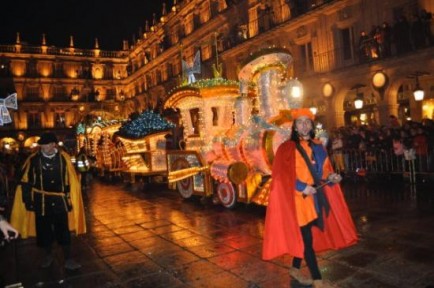
A time for giving: Three Kings Day is a hotly anticipated date on the calendar for Spanish children.
Christmas and its attendant festivities may be over for much of Europe this week, but Spaniards – and Spanish children in particular – still have one more celebration to look forward to: the much-loved El Dia de los Reyes, or Three Kings Day, on January 6…
Although Spain has begun to adopt a more Americanised approach to Christmas, including giving more and more gifts on Christmas morning, the traditional gift-giving day is January 6, held to mark the Biblical occasion when the three wise men made it to Bethlehem bearing gifts for the baby Jesus.
In Spain and many other Latin countries, it is on this day that children receive the majority of their festive gifts, preceded during the afternoon of January 5 by well-attended Three Kings parades that shuffle colourfully through every major town and city in the land.
A survey held in 2015 actually found that most Spanish children – 67% to be exact – prefer the legend of the Three Kings over Santa Claus (27%) when it comes to receiving gifts, while adults no doubt welcome the additional day’s holiday or, this being Spain, the chance to extend their time off until January 7.
In a land fond of parades, the Three Kings processions are actually some of the most hotly anticipated in Spain, with Madrid’s attracting more than 100,000 people each year, who line the streets to watch the colourful performers and to hopefully catch a handful of the treats thrown from the floats as they pass by.
On the Costa del Sol, Málaga and Marbella are just two of the many places that hold notable processions, with regional variations in the types of traditions and food consumed evident across the country. Nationwide, however, it is quite common for Spanish children to leave their shoes outside their door on the night before the Epiphany of January 6 to allow the Three Kings to leave some gifts inside, or alongside, them.
More gifts arrive in the form of the sweet Roscon Cake, which is decorated with candied fruit and often baked with a toy or a coin inside.
These traditions have formed the bedrock of Spanish society for centuries, and are fun for the entire family. So if you are a British expat with kids living in Spain, it pays to be prepared – so hit the January sales, get baking, and treat yourself to yet another day’s holiday!
 en
en



 Vlaams-Nederlands
Vlaams-Nederlands
0 Comments
Leave a Comment
DISCLAIMER
The opinions and comments expressed by contributors to this Blog are theirs alone and do not necessarily reflect the views of VIVA Homes Under the Sun Ltd, any of its associated companies, or employees; nor is VIVA to be held responsible or accountable for the accuracy of any of the information supplied.
Have you got something to say?